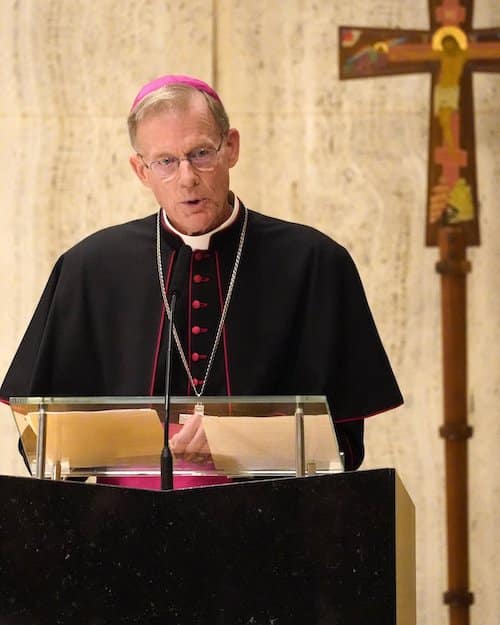WASHINGTON (OSV News) –The U.S. Senate recently passed a bill to extend and expand in scope a law that compensates Americans who were exposed to radiation by the federal government, and advocates are urging the U.S. House to follow suit.
The Radiation Exposure Compensation Act, first enacted in 1990, provides some financial compensation to Americans exposed to radiation by nuclear testing and uranium mining during World War II and the Cold War. However, the existing law is set to expire in June. An expanded version of the legislation would broaden eligibility for some Americans who currently do not qualify under the terms of the existing, soon-to-expire law, including some located near the Trinity atomic bomb test in 1945, or those who were exposed to radiation after 1971.
Archbishop John C. Wester of Santa Fe, New Mexico, a vocal proponent of nuclear disarmament, and Anne Avellone, director of the Archdiocese of Santa Fe Office of Social Justice and Respect Life and the archdiocesan Justice, Peace and Life Commission, cited the recent success of the film, “Oppenheimer,” arguing the film “brings to new audiences an awareness of the development of the atomic bomb and its perils.” The movie is about the life of Robert Oppenheimer and his work developing the first atomic bomb, and some of it was filmed in New Mexico.
“However, we recognize the very real and lasting impact of the development and testing of the atomic bomb has had serious and often deadly health impacts on the people of New Mexico and throughout the country,” Archbishop Wester and Avellone said in a joint statement on March 18. “People like uranium miners and the Downwinders of New Mexico are unwitting victims who had no choice in being exposed to radiation. It is unfortunate that such a remarkable and timely film does not acknowledge these realities.”

The statement added that the “very same week ‘Oppenheimer’ received so many accolades in the motion picture world, the U.S. Senate passed by a vote of 69 to 30 a bipartisan reauthorization of the Radiation Exposure Compensation Act (RECA), which compensates people who have had health issues due to radiation exposure from the atomic testing and uranium mining.”
Expands compensation
“This bill expands previous bills to include compensation to communities in regions of Nevada, Utah, and Arizona which are currently not covered by RECA, and for the first time covers New Mexico (to include those downwind of the Trinity test site), Colorado, Idaho, Montana, Guam, and parts of Alaska, Kentucky, Missouri, and Tennessee, as well as uranium miners exposed between 1971 and 1990,” the statement said.
Sen. Josh Hawley, R-Mo., who introduced the legislation, said in March 7 remarks on the Senate floor, “This isn’t about a handout.”
“This isn’t about some kind of welfare program,” he said. “This is about doing basic justice by the working people of this nation, whom their own government has poisoned. This is the day when we break the cycle of lies from the government, when we break the cycle of passing the buck and irresponsibility from the government.”
Hawley’s office said the expanded legislation would include his constituents in Missouri who were exposed to contaminated water from uranium production.
Sen. Ben Ray Luján, D-N.M., one of the co-sponsors of the bill, said in a March 7 statement, “Today’s bipartisan vote delivers a clear message to the generations of New Mexicans living with the lasting impacts of the Trinity Test that our country has a moral obligation to address this injustice and compensate families for their suffering.”
“In addition to New Mexico being the home of the Trinity Test, the original RECA program failed to include coverage for the thousands of New Mexicans who worked in the uranium mines after 1971,” Luján said. “These workers who helped develop our nation’s nuclear arsenal and those living near mining operations lacked meaningful safeguards or protection. As a result, far too many were exposed and sadly became sick or died.”
Archbishop Wester and Avellone said in their statement, “We thank the sponsors of the bill, Senator Ben Ray Lujan (D-NM), Senator Mike Crapo (R-ID), and Senator Josh Hawley (R-MO), for their work passing this bill.”
“Now the bill goes to the House, where we urge its passage so families who struggle with devastating cancers and chronic health issues directly related to mining and testing will receive long overdue acknowledgment and financial support,” they said.
The pair urged supporters of the legislation to call the office of House Speaker Mike Johnson, R-La., to express support for the bill.
Johnson’s office did not immediately respond to a request for comment from OSV News on his plans for the legislation.





